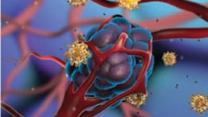
Predictive Drug-companion Diagnostic Test for Cancer Therapeutic Resistance
Problema a solucionar
Despite the efforts made to date, there still exists a need in the art for novel compounds and/or therapies useful in cancer treatment, particularly in those cancer patients who become irresponsive to anti-angiogenic treatments.
Aplicacions
This technology can be used for the prediction of response to AA treatment in cancer patients, as a cancer biomarker (diagnostic kit), that allows the selection of subgroups of patients that will benefit the most from our new treatment, as well as this could clearly translate into decreasing the economic burden of cancer treatment costs for the Public Health Systems.
Estat de la tecnologia
The biomarker has successfully been validated in animal models and in vitro with tissue and blood samples from patients. For the biomarker kit we are requesting budgets for the design of our initial prototype. For the NCE we are currently performing HIT confirmation in vitro and in silico.
Context
Tumor growth is typically dependent on angiogenesis, which can be inhibited with antiangiogenic therapies, in order to impede tumor nurture and growth. Indeed, several angiogenesis inhibitors have proven to be a successful strategy in the treatment of various cancers increasing patient survival. This therapeutic strategy has provided clinical benefit in several solid tumor types, and Bevacizumab (monoclonal antibody against VEGF-A 165) remains approved for colorectal, renal, nonsquamous/non–small-cell lung cancer, and glioblastoma. Small-molecule inhibitor data are less mature, but similar observations have been made regarding Sorafenib and Sunitinib, promoting investigation into potential mechanisms of escape from anti-VEGF therapy. But there is still a need for novel cancer therapies, especially for antiangiogenic resistant tumors. Furthermore, there are still no biomarkers in routine clinical use in antiangiogenic therapies. Particularly in the past decade the methods used in prognosis and prediction of response have not advanced in any significant way. Thus, nowadays patients continue to be exposed to potentially toxic therapies with no possibility of prediction of response probability. Therefore it will be necessary to identify possible biomarkers in RCC. We focus on recent findings in our understanding of the molecular signature of RCC, and the potential for such knowledge to provide novel markers and therapeutic targets.
Tecnologia
RF-1 is a predictive drug companion biomarker that has a valuable asset for any Pharmaceutical or Biotech Company seeking to improve health outcomes and ensure that their products are provided to patients who are most likely to benefit from them. We will simultaneously develop two of technical activities: 1. Development of the prototype of a kit to determine a patented biomarker for the prediction of treatment response in cancer patients treated with AA therapies. 2. Development of a New Chemical Entity against a new therapeutic target of AA resistance. RF-2 will be initially prioritized to patients of two types of prevalent cancer (kidney and liver). In which AA therapy is first-line treatment and resistance to these current therapies is indeed a medical problem to be solved.
Autors
Casanovas O (IDIBELL, ICO)
Technology Readiness Level
TRL 4
Què busquem?
Acord de llicència
Codesenvolupament
